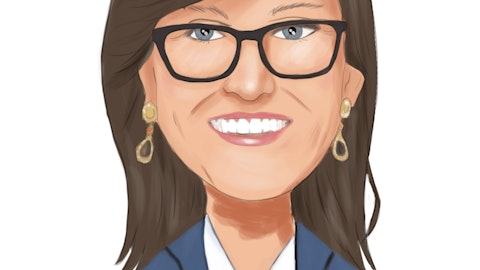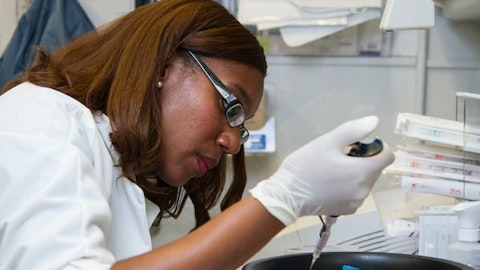And so we’ve been engaging in those discussions, continue to engage in discussions, don’t have anything to report at this point, but it’s been key part of our strategy because quite frankly, if we can find a partner that gets – that helps us commercialize through the journey, then that reduces dramatically the amount of capital that we need to build a sales marketing engine. And I’ve done this in many – several companies now built these out. I know how to do that, but it costs capital. And so being able to leverage somebody to do it through the journey is part of our strategy. We haven’t been able to execute on that yet, but I think having the product live and having some great clinical data is, and we’re sitting where we are right now. And we feel like we’re well situated to continue moving the ball down the field.
Dan Brennan: And would that be something more likely after Medicare coverage gets in place? So you have more power or just kind of any sense on timing of a commercial partnership?
Chris Hall: When we identify the right partner and get an agreement put together is when we would announce something. I think sooner is always better than later in these things, honestly. The reason is because this current period that we’re in, we call it early access program. So we’re currently – we have a set of early adopters that, and we have demand that we’re sort of working through. This is the time that you work through the systems, you work through your call points, your talk tracks, you work through your marketing material, you build more clinical evidence, you start to develop advocates. And so, and then when we get Medicare coverage, we expect to be all systems go, pushing the gas down on the – pushing the gas down and really, trying to build revenue as quickly as we can on the back of that. And so, ideally having a commercial partner before we do that, so we learn how to work together would be what we’re shooting for.
Aaron Tachibana: Yes. And so we did announce that we’ve launched the product. We have an early access program. So we are engaged with oncologists. We have real tests coming in to our operation now. And in terms of the sales team, we have a small sales team today, but we will continue to add to that and build that until at the right time until we have a partner, right? And so we’re planning for success. And like Chris mentioned, a partner is going to help us be capital efficient. We won’t have to go and hire a really large sales force and spend a lot of money on that, assuming we can find a partner sooner rather than later, but we’re going to continue down the path to build a commercial team until we do have something done.
Dan Brennan: And maybe just one follow up, just on filing the three assays next year, could you just give us a sense of like, by the time you file, what kind of dialogue will you have had with Medicare ahead of it, just to ensure like you’ve got the right data package in place? And I guess it’s fair to think either colorectal or breast will be the bigger opportunity, just given the size of the market or that that’ll be, you know, one of those two will be the area where you probably feel you have the most opportunity, just maybe any color on those two questions? Thank you.
Chris Hall: Well, I think it’s good, it’s an interesting. Yes. So the answer is, yes, we will engage. We’ve already had dialogues with Palmetto and we’ll continue to have dialogues with them as we go forward. I think – so the three indications are lung, breast and IO, they’re in different spots. So lung is one where we have a shot to be really like the kind of the early, the first coverage really in that indication, I think it’s fair to say an early stage lung. And we think the data is really compelling and really great there. In I/O therapy, it was one of the first indications after CRC that got coverage. And so there’s a really nice benchmark set of data out there that we feel like we’ll have as robust or more complete or larger data set can exceed that in size.

